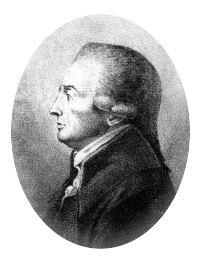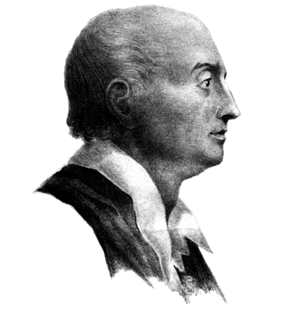<Back to Index>
- Philosopher Salomon ben Josua Maimon, 1753
PAGE SPONSOR


Salomon ben Josua Maimon (Hebrew: שלמה מימון) (1753 - 22 November 1800) was a German philosopher born of Jewish parentage in Belarus.
Salomon Maimon was born and grew up in Mir in the Grand Duchy of Lithuania (now in Belarus). He finished Jewish school in Mir, and learned the Talmud by age 9. He was only eleven when he was married to a girl from Nesvizh. At the age 14 he was already a father and was making money by teaching Talmud. Later he learned some German from books and walked all the way to Slutsk, where he met a rabbi who had studied in Germany. He borrowed German books on physics, optics and medicine from him. After that he became determined to study further. He abandoned his family at the age of 22.
At the age of 25 he left for Germany. An attempt to convert into Christianity in Hamburg failed due to admitted lack of belief. The first attempt to take residence in Berlin in 1778 also failed, he was expelled for possession of the Moreh Nebukhim of Maimonides. The second attempt in 1781 succeeded. He studied medicine in Berlin. In 1770 he severed his connection with his orthodox co-religionists by his critical commentary on the Moreh Nebukhim of Maimonides, and devoted himself to the study of philosophy on the lines of Wolff and Moses Mendelssohn. The latter introduced him to some wealthy Jews in Berlin. After many vicissitudes he found a peaceful residence in the house of Count Kalkreuth at Nieder - Siegersdorf in 1790. During the ensuing ten years he published the works which have made his reputation as a critical philosopher, the most popular work being his Autobiography, published in 1791. Hitherto his life had been a long struggle against difficulties of all kinds. From his autobiography, it is clear that his keen critical faculty was developed in great measure by the slender means of culture at his disposal. It was not until 1788 that he made the acquaintance of the Kantian philosophy, which was to form the basis of his lifework, and as early as 1790 he published the Versuch über die Transcendentalphilosophie, in which he formulates his objections to the system. He died at the age of 46 from apparent alcoholism.
He seizes upon the fundamental incompatibility of a consciousness which can apprehend, and yet is separated from, the thing - in - itself. That which is object of thought cannot be outside consciousness; just as in mathematics - 1 is an unreal quantity, so things - in - themselves are ex hypothesi outside consciousness, i.e., are unthinkable. The Kantian paradox he explains as the result of an attempt to explain the origin of the given in consciousness. The form of things is admittedly subjective; the mind endeavors to explain the material of the given in the same terms, an attempt which is not only impossible but involves a denial of the elementary laws of thought. Knowledge of the given is, therefore, essentially incomplete. Complete or perfect knowledge is confined to the domain of pure thought, to logic and mathematics. Thus the problem of the thing - in - itself is dismissed from the inquiry, and philosophy is limited to the sphere of pure thought. The Kantian categories are demonstrable and true, but their application to the given is meaningless and unthinkable. By this critical skepticism Maimon takes up a position intermediate between Kant and Hume. Hume's attitude to the empirical is entirely supported by Maimon. The causal concept, as given by experience, expresses not a necessary objective order of things, but an ordered scheme of perception; it is subjective and cannot be postulated as a concrete law apart from consciousness. The main argument of the Transcendentalphilosophie not only drew from Kant, who remarked that Maimon alone of his all critics had mastered the true meaning of his philosophy, but also directed the path of most subsequent criticism. Nevertheless Kant wrote in a private letter to K.L. Reinhold that "Jews making attempt to gain significance on account of someone else".